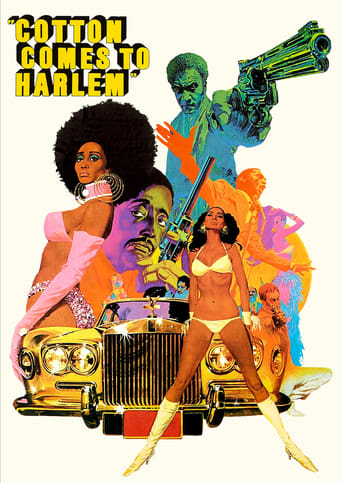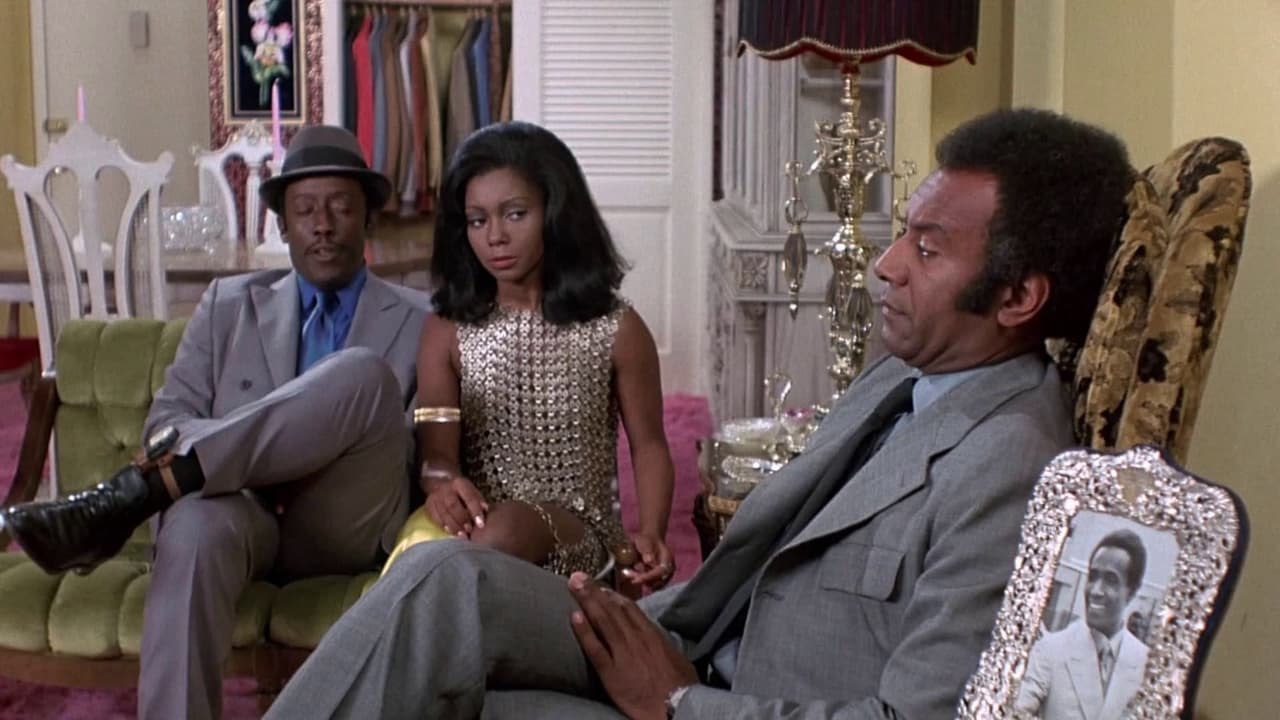inspectors71
If you can get passed the general nastiness of Ossie Davis' Cotton Comes to Harlem, the reverse stereotyping--making white characters functioning morons and black characters vicious, cunning, and foolish-- there's not a bad little story here. Raymond St. Jacques and Godfrey Cambridge are appealing New York detectives--street cool and underlying moralists--who are on the trail of a smarmy community organizer--er--street preacher who is ripping off his own congregation, laying further waste to Harlem's poor, and doing it all with a fine vocabulary and wardrobe and a wife who has beautiful arms.Wait a second. I'm getting my con men mixed up here.CCTH is as incoherent and as blacksploitation as you would expect, but the fun and humor and cinematography and Judy Pace are all so lush that long after you've given up on trying to make hide nor hair out of the incomprehensibilities, you're still in it to finish it.The movie can't decide if it wants to be relevant or a piece of spoofery. If you don't mind or care, sit back and enjoy the ride.
zardoz-13
Not only did "Cotton Comes to Harlem" mark the directorial debut of actor & writer Ossie Davis, but also this early blaxploitation epic introduced audiences to a pair of tough-talking, incorruptible New York Police Detectives nicknamed 'Gravedigger' Jones (Godfrey Cambridge of "Watermelon Man") and 'Coffin Ed' Johnson (Raymond St. Jacques of "Cool Breeze") as they contend with a charismatic religious figure whom they suspect may be swindling of his own poor people. The chief difference between "Cotton Comes to Harlem" and a standard white crime movie is the protagonists are African-American. The slang is predominantly African-American, but other minorities participate in the action, primarily the Italian mafia. The protagonists are the usual iconoclastic individuals who have alienated themselves from higher authority with their abrasive behavior. A police captain complains that Gravedigger and Coffin Ed have smart mouths, are quick with their fists, and too fast with their guns. Clearly, as far as the captain is concerned, Gravedigger and Coffin Ed qualify as maniacs who have no business in an investigation that is a powder keg of racial tensions. Their white police lieutenant defends them. He explains that they have a special way of handling Harlem crime and if they suspect somebody of criminal behavior, the lieutenant defers to their judgment. Meantime, Gravedigger and Coffin Ed see their job has protecting "the Black folks from the White folks." Initially, when we first see the Reverend Deke O'Malley (Calvin Lockhart of "Dark of the Sun"), he is in a Rolls Royce, cruising through gritty Harlem streets to a rally for his "Back To Africa" campaign. Gold money car with the silhouette cut-out of a luxury liner displayed prominently on its roof follows. This is the ship Rev. Deke calls 'Black Beauty.' Deke is selling tickets on it at a $100 minimum to take African-Americans back to Africa. Although the white establishment supports Deke, Gravedigger and Coffin Ed suspect Deke is swindling poor blacks out of their hard earned bucks. During the rally, Deke explains that God anointed him while he was in jail to build an ark and take his people back to Africa. While this self-proclaimed Noah assures blacks he can provide them with a better way of life away from racist white America, masked thugs in orange suits armed with submachine gun shoot up the meeting and rifle the safe in Deke's gold-painted armored car. They kill one of Deke's uniformed guards, John (Tony Brubaker of "Slaughter's Big Rip-Off"), and his wife watches him die. The robbers careen off in a meat truck with Deke following them and our heroes in hot pursuit.During the chase, a bale of raw, unprocessed cotton flies out of the rear of the truck onto the sidewalk. The robbers strafe Gravedigger and Coffin Ed. They collide with a produce wagon transporting watermelons. Eventually, the robber's truck and the armored car crash and burn up. Meanwhile, Gravedigger and Coffin Ed search for Deke. They visit his girlfriend, Iris (Judy Pace of "Three in the Attic"), and question her with luck about Deke's whereabouts. While they are interrogating Iris, Sergeant Jarema (Dick Sabol of "Come Back Charleston Blue") enters and informs them Lieutenant Anderson (Eugene Roche of "The Happening"), wants them at the scene of the accident. They order Jarema stay behind to keep an eye on Iris. Iris taunts Jarema into having sex with her. She makes him wear a brown paper bag. While he is putting on the bag, she escapes. Jarema locks himself out of her apartment, completely naked in the hallway for the other residents to see. Captain Bryce (John Anderson of "Young Billy Young") reprimands our heroes for suspecting Rev. Deke is a scammer. Later, Bryce complains to Anderson about their behavior. Deke decides to stay out of sight and conduct his own investigation. He convinces the wife of one of his dead guards to let him stay with her. Eventually, Gravedigger and Coffin Ed get Iris to inform on Deke and he goes to jail, but his attorney gets him out. Everybody is looking now for the bale of cotton that contains the stolen $87-thousand. Uncle Budd (Red Foxx) finds the bale and sells it for $25 to Abe Goodman, but Budd buys it back for $30. Eventually, our heroes catch up with Deke and expose him for the swindler that he is. Director Ossie Davis and television scribe Arnold Pearl penned the screenplay from Chester Himes' novel. Some of the dialogue is very sharp as are the blaxploitation slogans: "Keep it black till I get back." "Is that black enough for you?"Davis dilutes the thrills and chills of the meat truck & armored truck pursuit scene with four smaller scenes within it. These four sub-scenes feature mild comedy, while the primary scene depicts a chase through the streets of New York City. The gunmen in the meat truck riddle the unmarked police car, blast out its window, blow out its headlights, and obliterate the outside rearview mirrors. Oops, the driver's outside rearview reappears after bullets have torn it off the door when our heroes crash into a watermelon wagon.Several messages pervade this above-average crime thriller about the search for stolen loot. First, the meek shall inherit the Earth. Second, crime doesn't pay and criminals have to pay to ply their criminal vocation. Harlem blacks should control Harlem, not the Italian mafia. Our heroes force the Italian mafia to turn over their Harlem operation to a Black racketeer. Black women can outsmart white men. One black woman is depicted as a 'stone fox,' and she makes a buffoon of a cretinous white police sergeant. The interesting question that arises but is never resolved—and by extension gives "Cotton Comes to Harlem" a surreal quality—concerns the raw, unprocessed bale of cotton. Where did it come from and what is it doing in Harlem? Nobody ever answers this question.
winner55
Over the years, I've seen this movie on old, grainy, scratchy prints with runny color and muffled sound. I just viewed the DVD of this movie, and it's the first viewing I've had of a decent print with a decent video transfer. This has led me to revise what I long thought of the film.First revision: I hadn't before realized how good the cinematography is. The images are detailed, well-composed, and carefully lit; the editing is sharp without being obvious.I also hadn't recognized how good the acting is; the actors are all energetic without chewing up the scenery, they are clearly working hard to capture the right tone for the piece without looking like they're working hard.Finally, now that I can hear all the dialog clearly, I realize, first, just how funny it is, and second, just how true to the source novel it is. Although Davis adds touches here and there, and of course some of the novel gets left out, Davis is really making a strenuous effort to remain true to the spirit of Chester Himes, one of the finest American novelists writing in the crime genre.Because Davis pushes his characterizations perilously close to stereotypes, the film will probably never receive the recognition it deserves. I think Davis manages to restrain the stereotyping at all the right moments, and the whole film comes together beautifully. In short, this is a true classic.
MartinHafer
This is a decent and very watchable film--the first so-called "blaxploitation" film. However, this label is hard to apply to this film because although it has many of the sensibilities (stupid White cops as well as gratuitous nudity), it also features some things you never or rarely see in this genre. First, the heroes of this film are Black cops (Coffin and Gravediffer)--and cops are NOT leading men in blaxploitation films! Second, one of the biggest scumbags in the film is a Marcus Garvey-like Black con-man, the Rev. Deke O'Malley. So instead of trying to pigeonhole this film into this genre, I'd rather just judge it by itself.The film has an excellent R&B score--one of the better ones of the era. The acting by all was very good, though Godfrey Cambridge came off the best of the lot. Direction by veteran actor Ossie Davis was also pretty good.One serious complaint is that the film doesn't seem to know, at times, whether it's a comedy or drama--I wish it had stuck a little closer to one or the other. The other problem is that while the movie was definitely intended to appeal to Black audiences, it could have resounded well with all audiences if they'd let up a little on the negative attitudes towards Whites--though, back in 1970, I could certainly understand all the anger, resentment and mistrust. Heck, had I been Black back then, I'm pretty sure I would have hated White folks as well. It's too bad really, as because of this most non-Black audiences would miss out on seeing a good film.By the way, the movie makes a couple references to Marcus Garvey. The Reverend's character was based on him, though Garvey by almost all accounts did not intend to cheat investors in his Black cruise line. Try reading up on the man--he's one of the most interesting yet forgotten civil rights leaders of the 20th century.



 AD
AD



